The attacks in the North of Kosovo, which resulted in the killing of a Kosovo Police officer by an armed group, have plunged Kosovo into a state of national mourning. The attack is being considered a terrorist act and is allegedly orchestrated by official Belgrade, with an arsenal of weapons being found in Banjske. This could mark a turning point for Kosovo-Serbia dialogue.
Kosovo awoke on Monday in a state of national mourning. The early morning of the day prior, one policeman had been killed, another wounded, and a third injured by an armed group that Kosovo institutions considered a professional terrorist formation.
The killing followed an exchange of gunfire between the terrorist group and the Kosovo police, resulting in the deaths of three raiders, the arrest of two others, and the apprehension of four civilians.
Kosovo institutions placed heavy blame on Belgrade and Serbian President Aleksandar Vučić for their alleged involvement in the organized terrorist attack.
In contrast, during a press conference on Sunday evening, Vucic accused Kurti of inciting Sunday’s crisis.
During a press conference on Monday afternoon, Kosovo’s Internal Minister, Xhelal Sveçla, and the Director of Kosovo Police, Gazmend Hoxha, hailed Sunday’s police action in the north as one of the most successful operations ever.
“We call on Serbia to surrender the six wounded terrorists who are receiving treatment in the Hospital of Novi Pazar [a Serbian city], so they can be brought to justice for their terrorist acts. We also request Serbia to extradite all the group members who escaped to Serbia,” stated Interior Minister Sveçla.
At least five of the attackers are suspected of belonging to the terrorist group known as “The Civil Protection,” according to Svecla. The discovery of Milan Radoicic’s [vice-president of Serbian List party] gun permit, found in one of the confiscated cars, implicates him in the attack, and he may have been one of the attackers, the Minister stated. Radoicic is also suspected of being one of the wounded raiders.
During their operations, the police discovered numerous weapons of various types and calibers, uniforms, and logistical equipment, including heavy military weapons such as grenades, mortars, machine guns, and Kalashnikovs, among others. These findings were made in several locations, residential areas, and vehicles used by the terrorist group to block roads.
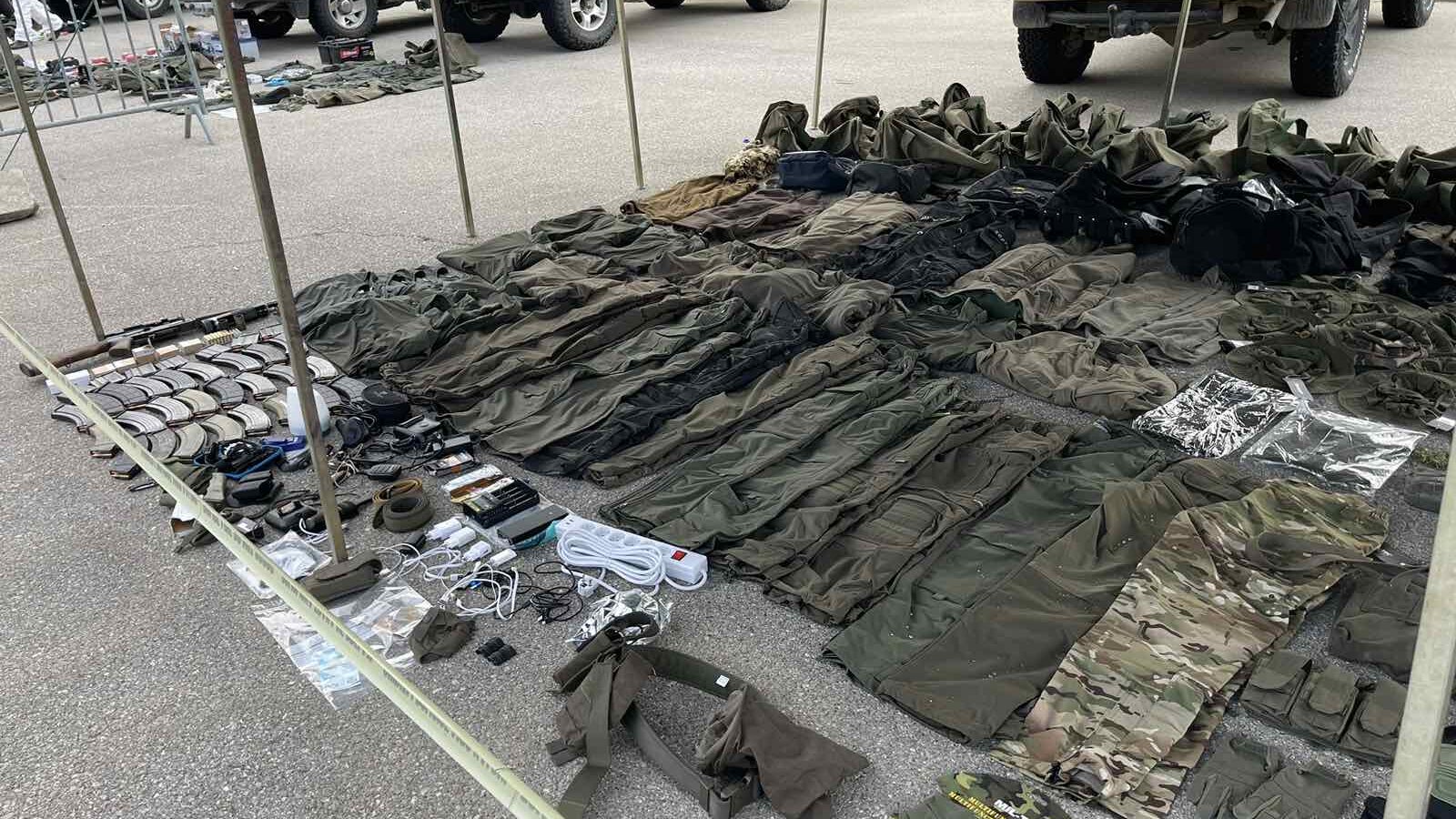
Photo: Adelina Ahmeti/BIRN
Some of the firearms matched those used in recent clashes in the North, including the attack on KFOR, as confirmed by the police. The Minister and the Police officer noted that some information is classified, and not everything can be shared with the media. BIRN editor Kreshnik Gashi pointed out that the attackers had donned uniforms resembling those of the Kosovo Special Police forces, drove identical vehicles to KFOR, and displayed KFOR stickers. According to him, these tactics likely facilitated the movement of this group within Northern Kosovo.
During the press conference, maps and armaments of the terrorist group were presented, which, according to Sveçla, had not been assembled ad hoc but had been prepared over a long period.
“The police action is still ongoing, and we are continually discovering ammunition in the village of [Banjske] and its vicinity,” confirmed Sveçla on Monday.
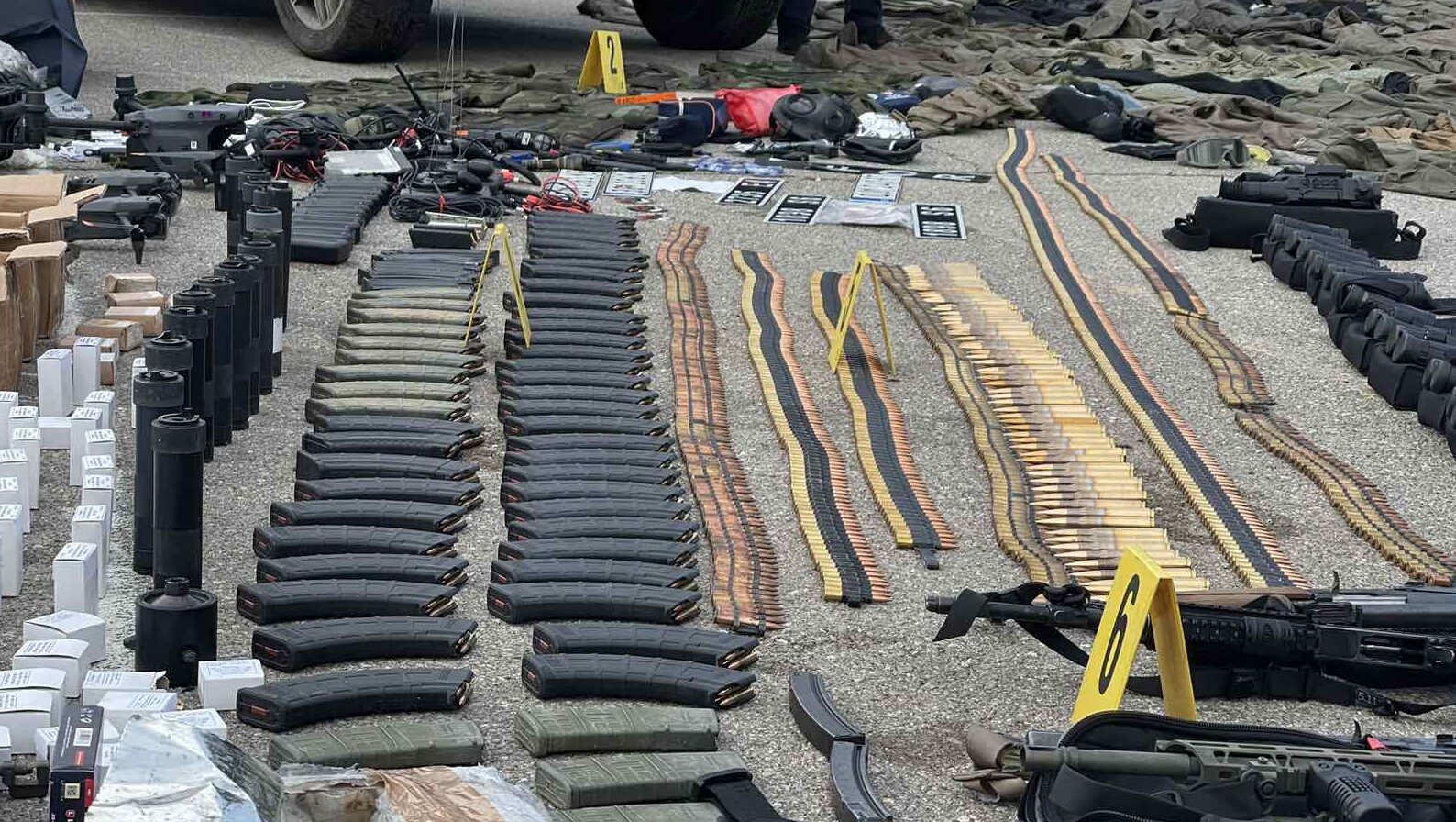
Photo: Adelina Ahmeti/BIRN
On Monday, Kosovo’s President, Vjosa Osmani, declared the killed policeman, Afrim Bunjaku, a “Hero of Kosovo” during a commemorative gathering held in his honor.
“He fell in defense of the dignity of our Republic. From today onwards, Kosovo has another hero who sacrificed his life for the safety of our citizens. Afrim Bunjaku was challenged by the Belgrade gangs,” said Osmani.
The attack of Sunday
The preceding Thursday, new graffiti with a provocative message were discovered on the streets of Zveçan by the Kosovo Police. The graffiti featured the message “When the army returns to Kosovo,” which was deemed hate speech by the police.
Three days later, on Sunday, shocking news broke about the killing of a policeman by an unidentified armed terrorist group.
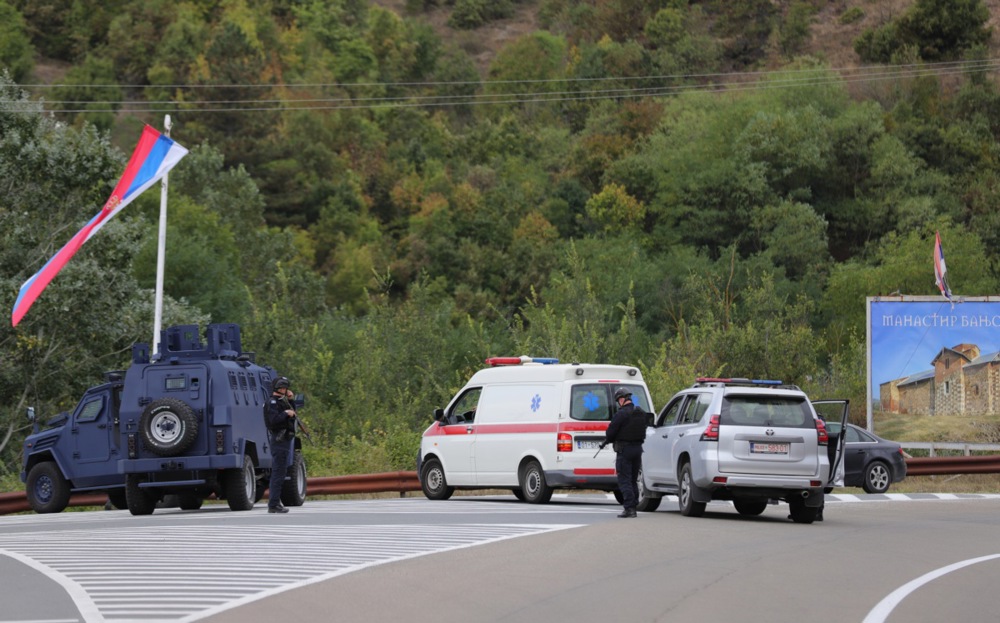
Kosovo police officers guard a checkpoint on the road near the village of Banjska following an attack, in Kosovo, 24 September 2023. Photo: EPA-EFE/STR
The attack began at 02:34 am when the Kosovo Police’s Rapid Response Unit, patrolling near the village of Banjskë, encountered two unlicensed heavy vehicles blocking the entrance to a bridge. Upon their arrival, three police units were attacked from multiple positions with various weapons, including grenades and explosives. This attack resulted in the death of the policeman Afrim Bunjaku.
The armed group, suspected to consist of around 30 individuals, then fled to the Monastery of Banjska, where they continued their assault.
Following more than 16 hours of intense attacks, the armed group members escaped through a nearby mountain. Subsequently, the Kosovo Police, under the supervision of the Special Prosecutor and in coordination with EULEX and KFOR, entered the Banjska Monastery. AP published a video showing the group of gunmen walking from Serbian Orthodox monastery in Kosovo.
The outcome of the firefight was as follows: three of the suspected attackers were killed, and six others were arrested. Two of the arrested individuals were armed and in uniform, while the remaining four were found in possession of portable radios, according to official Kosovo sources.
On Sunday evening, Kosovo’s Prime Minister, Albin Kurti, announced that the operation in Banjska was “still ongoing.”
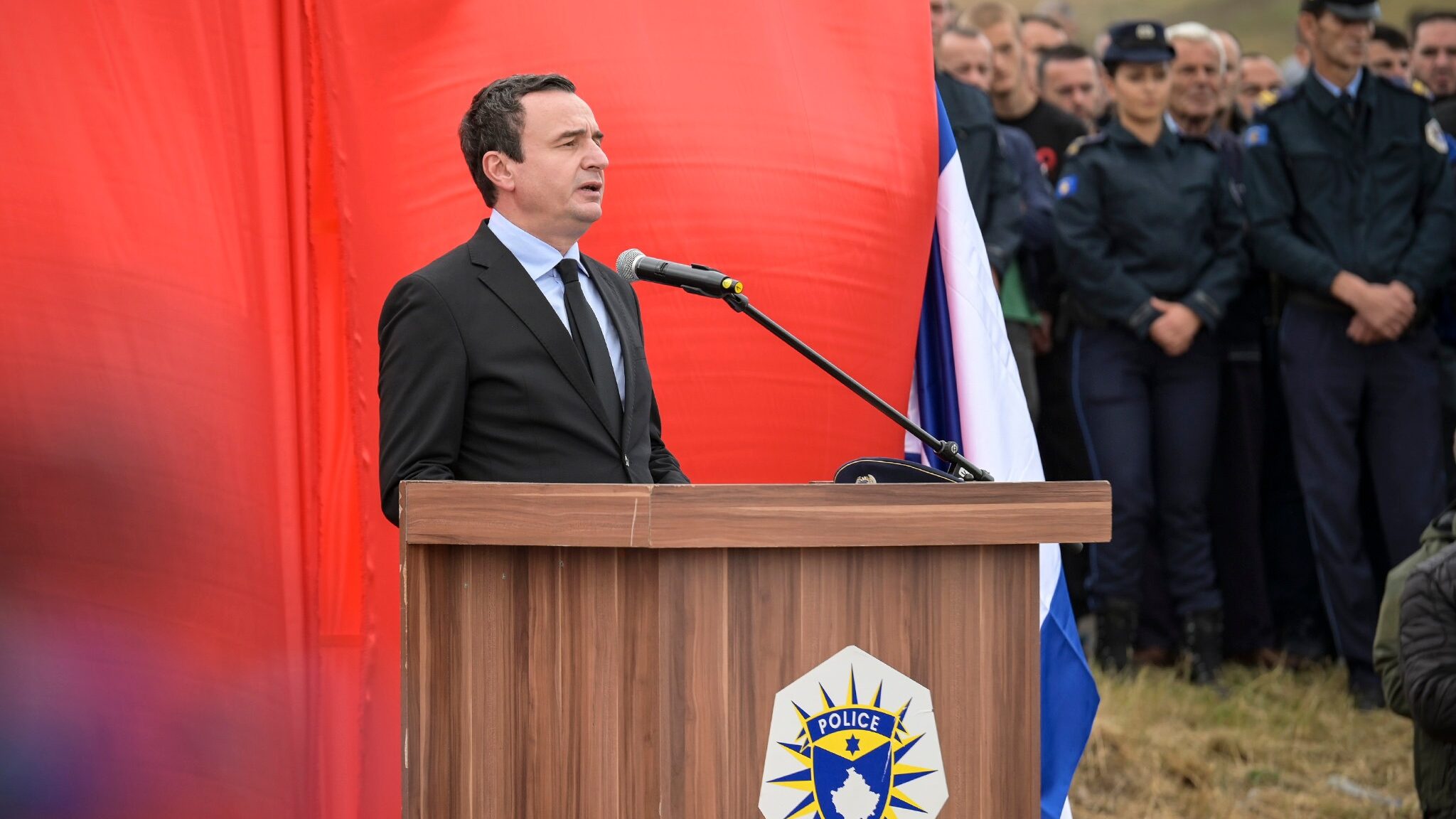
Kosovo PM Albin Kurti speaking at the burial ceremony of the killed police officer in the north, Afrim Bunjaku. Photo courtesy of PM Kurti’s Facebook page.
A terrorist attack on the constitutional order
Both the Kosovo government and the EU have classified this incident as an attack on the constitutional order of Kosovo, categorizing it as a terrorist act.
The Special Prosecution of Kosovo has confirmed that the case is being treated as an assault on the constitutional order, which includes acts of terrorism.
“It is evident that preparations had been underway for an extended period to launch a massive assault on the Kosovo Police, state institutions, and to seriously undermine the territorial integrity and sovereignty of Kosovo,” stated Minister Sveçla during a press conference on Sunday.
Sveçla further asserted that this attack against the Kosovo Police received support from the “state of Serbia.”
Prime Minister Kurti squarely placed the blame on Belgrade, emphasizing that this attack had been organized with political, financial, and logistical support from official Belgrade.
“…and these are vehicles not owned by local businesses or civilians in our republic. These trucks were strategically placed on the bridge to obstruct traffic… Heavily armed individuals equipped with military gear and masks were observed around the Banjska Monastery,” Kurti stated during a press conference, while presenting photographs of vehicles without plates and an armored vehicle, which, according to him, were intended for urban warfare.
KFOR “ready to respond if required”
Following the attack, KFOR issued a statement to the media on Sunday, indicating that while the Kosovo Police holds primary responsibility as the primary regulatory authority for managing the incident on the ground, KFOR remains vigilant and ready to respond as necessary.
“The KFOR Commander maintains close and continuous communication with all relevant international parties, including the EU, the Chief of the General Staff of the Serbian Armed Forces, and Kosovo institutions, and is actively working towards a resolution,” the statement states.
“The Kosovo Police, as first responder, has primary responsibility for managing the incident on the ground,” KFOR tweeted on Sunday.
As of the publication of this article, KFOR has not responded to Prishtina Insight’s inquiry regarding why KFOR did not intervene in this case, as it has in previous instances of turmoil in Northern Kosovo.
Fehmi Hoti, the Deputy Director of the Police, stated during a media conference on Sunday, “The Kosovo Police maintains constant communication and coordination with KFOR throughout this period.”
As the Kosovo Police entered the Banjska Monastery, they operated under the guidance of the Special Prosecutor’s Office and the supervision of EULEX and KFOR.
Reactions from the international community
The attack was condemned by the international community considering it unacceptable.
U.S. Secretary Anthony Blinken on Monday stated, “The United States strongly condemns the coordinated violent attacks on the Kosovo Police near the Banjska Monastery on September 24, and expresses deep condolences to the family of the Kosovo Police sergeant killed in the line of duty. ”
“The Kosovo Police have full responsibility for enforcing the rule of law in the Republic of Kosovo.,” Blinken added.
The European Union’s chief diplomat, Josep Borrell, engaged in a conversation with President Aleksandar Vucic as well. According to the EU’s statement, Borrell reiterated his call for the assailants to surrender immediately and for the safe release of pilgrims at the Banjska Monastery. He emphasized the need for the restoration of calm and stability.
The European Union’s envoy for the Kosovo-Serbia dialogue, Miroslav Lajcak, characterized Sunday’s attack as a cowardly act of violence that contradicts the principles of peace and cooperation. Lajcak emphasized that this “horrific attack further underscores the necessity of preventive diplomacy and dialogue.”
During a media conference on Monday, the spokesperson of the European Union, Peter Stano, did not specify whether the EU would take measures against Serbia. However, he mentioned that if the 27 member states saw any reason, they would consider measures against Serbia.
German emissary for the Western Balkans, Manuel Sarrazin, stated on Monday during a meeting with PM Kurti, “We strongly condemn this criminal and terrorist attack against the Kosovo Police. We are here to express solidarity and condolences to the families, the Kosovo Police, and the entire state.”
The U.S. Embassy in Kosovo condemned the attack, underscoring that the Kosovo Police has full and legitimate responsibility for upholding the rule of law in accordance with the constitution and laws of Kosovo.
Michael Davenport, the head of the OSCE in Kosovo, emphasized the swift need to bring those responsible for these heinous crimes to justice. He stressed the importance of restoring peace and continuing dialogue for the benefit of all communities.
Kosovo received moral support from the United Kingdom, Croatia, Turkey, the Netherlands, Israel, Montenegro, and Italy.
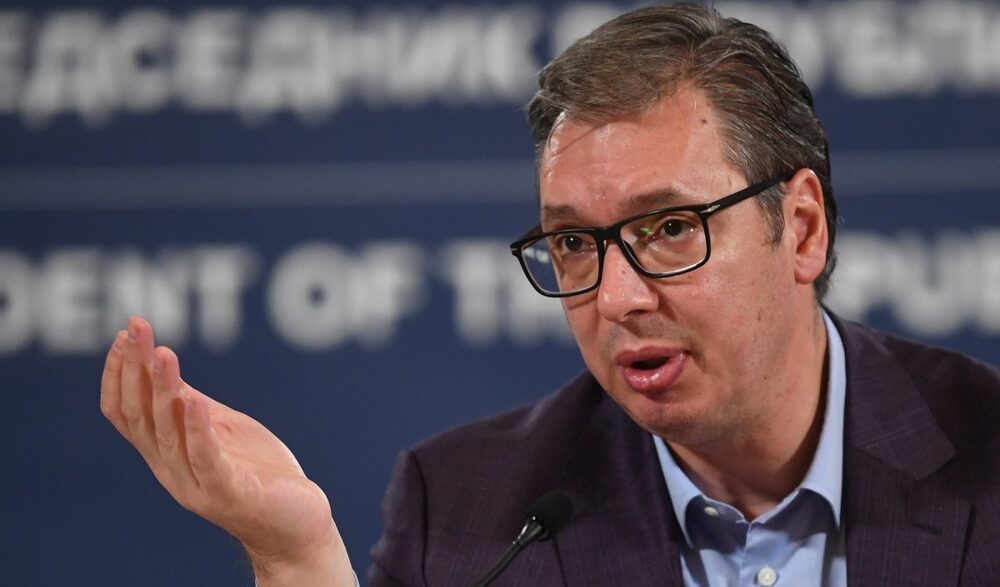
A handout photo made available by the Serbian Presidency shows Serbian President Aleksandar Vucic speaks during a press conference in Belgrade, 24 September 2023. Photo: EPA-EFE/DIMITRIJE GOLL
Serbia blaming Kosovo for inciting the attack
President of Serbia Aleksandar Vucic continued to blame Kosovo, labeling Albin Kurti as responsible for this situation. He said that the attack in Banjska occurred because “some Serbs from Kosovo” rebelled by erecting barricades, subsequently provoking the response of the Kosovo Police.
“These were Serbs from Kosovo, not individuals from central Serbia, as falsely claimed by Prishtina’s media. They rebelled because they did not want to endure.”
Kosovo Police has confirmed that some of the arrested raiders have Serbian citizenships and also Kosovar documents, without specifying how many of them, on the Monday’s press conference.
“I do not in any way condone the killing of an Albanian police officer and cannot justify it. It is a reprehensible act that should not have occurred,” Vucic emphasized on Sunday evening.
German Ambassador to Kosovo, Jorn Rohde, wrote on X[former Twitter] on Monday, “I wonder whether also Srpska Lista will stop its silence and join us all in our clear stance against this murderous attack on.”
Six hours after the ambassador tweet, the Serbian List, the largest Serbian party in Kosovo, supported by Belgrade, expressed condolences to the families of Serbian and Kosovo Albanian police officers, blaming the Government of Kosovo for this incident.
“We ask the international community why EULEX didn’t participate in the operation, but only Kurti’s police?” Lista Srpska inquired in their Facebook statement.
The Diocese of Raska-Prizren, which also includes the Banjska Monastery, condemned the attack on Kosovo Police on Sunday and emphasized that this incident could have “serious consequences,” so it is important to maintain peace.
The Diocese expressed concern because “a group of armed and masked individuals entered the Monastery in an armored vehicle, breaking the closed gate of the Monastery”, distancing themselves from the terrorist organised group.
What will it mean for the dialogue?
Ten days before the attack, on September 14th, Kurti and Vucic met in Brussels for high-level talks in the EU-mediated dialogue, but they failed to reach an agreement on the normalization of relations.
PM Kurti claimed that the European Union’s envoy for the Kosovo-Serbia dialogue, Miroslav Lajcak, had come to the trilateral meeting on September 14th in Brussels with an alternative scenario prepared in advance.
In EU envoy Borrell’s words, Kurti “was not ready to move forward with initiating a credible process for establishing the Association.”
Vucic accused Kurti of simply “avoiding the formation of the Association,” which he deemed to be the crux of the matter.
The EU’s Special Representative for Kosovo-Serbia negotiations, Miroslav Lajcak, stated on Monday after midnight that he would focus on finding a way forward in the dialogue in the coming days, following the armed attack on the Kosovo Police in the northern part of the country.
On Sunday, President Vucic asserted that Serbia would never formally or informally recognize Kosovo, but he expressed willingness to engage in talks. He urged the international community to establish the Association of Serb-majority municipalities and emphasized that in northern Kosovo, police officers should be Serbs.
PM Kurti stated in an interview with the Guardian, published on Sunday, that the EU-mediated negotiations with Serbia had reached an impasse. According to Kurti, ongoing instability has transformed the region into “a playing field for the geopolitical games of the Russian Federation and the People’s Republic of China.”
Tensions in northern Kosovo escalated in May when residents of predominantly Serbian-majority municipalities in the north rejected the newly elected Albanian leaders who emerged from elections they had boycotted.
Additionally, in June of this year, Serbia kidnapped and arrested three Kosovo police officers within Kosovo’s territory.
This marks the second case of a Kosovo Police officer killed in the North. In 2011, Kosovo Police officer Enver Zymberi was killed in the North a day after the government of Kosovo imposed trade sanctions on products made in Serbia.





